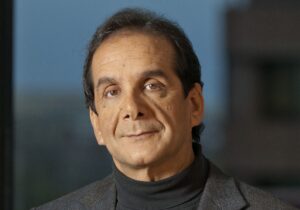The British writer William Brodrick was an Augustinian friar who became a barrister who became a novelist. As the latter, Brodrick is the author of the Father Anselm and (under the pseudonym John Fairfax) Benson and de Vere series of crime novels. From the former, the clerical detective Anselm Duffy mirrors Brodrick’s own journey but in reverse—Anselm being a lawyer who became a monk. Marbling within himself the practical and reflective characteristics respective to each vocation, Anselm, as Brodrick puts it, is a man of deep faith who understands that the nature of history and human beings means the imperative to implement justice in our world invariably provokes sometimes intractable juridical and theological questions. Anselm is at a restless sort of peace with this, and so while he is able to grasp the “troubled questions” attending human life, he eschews wrongfully “trim answers.”

This bears out in A Whispered Name, a lyrical reflection on responsibility, judgment, grief, the elusiveness of justice, reconciliation, and human longing. Though it is the third novel in the Father Anselm series, it is the first I’ve read—but this doesn’t seem to have done me any harm. In fact, I was rather surprised to discover it is not the first, as the novel has a sometimes-introductory feel, frequently touching on the backstory involving Anselm’s eventual taking of orders years earlier. This is important, as Anselm’s spiritual journey is, I think, faintly paralleled in the novel’s primary storyline.
It’s a tricky plot to describe in any detail without revealing too much—which would dull the edge of the detective story—so I won’t stray far from the jacket blurb. The story begins with an unsettling encounter on the monastery grounds, after which Anselm begins an investigation into the hidden secrets of his priory’s late founder, Father Herbert Moore. Decades earlier, amidst the horrors of the Great War’s Battle of Passchendaele, then British Army Captain Moore presided over the field court-martial of a young Irish volunteer, Joseph Flanagan, charged with desertion—a capital crime. It appears that Moore attempted to intervene in the inevitable outcome of the trial. Why he did so and what he managed to achieve form the more basic elements of an increasingly complex mystery. The remarkable truth only emerges after Anselm has himself delved vicariously into the carnage of war and witnessed the limits of human endurance and the inexhaustible charity of the human spirit grounded in a faith that sees beyond present calamity.
This relationship between present calamity and future hope forms one of the novel’s leitmotifs. Appearing to channel his Augustinian sensibilities, Brodrick again and again gestures to human longings for something without which our restless hearts will never find solace. This is seen in both the profound—Herbert Moore the battle-wearied soldier who looks hungrily beyond war to a time of peace, to the more quotidian—Anselm the successful barrister increasingly dissatisfied with professional life set against his growing awareness of a monastic calling.
This passion for a future joy in a world that so often seems hellbent on extinguishing it requires cultivation if it is to endure. When asked what the monks do in their monastic life, Father Moore responds, “We tend a fire that won’t go out.” For Moore, the steady rhythm of monastic life “had disclosed something basic to his humanity”:
He hungered for something within reach and out of his reach; he looked to a Beyond that was near and yet far; he sensed another place over the burning leaves, a green Kingdom behind so many broken windows.
This vision of a realm beyond the here-and-now does not supersede the fact that we have a job to do. What Brodrick does so well is to insist that the spiritual life needn’t be—mustn’t be—aloof of the conditions of the world. Time and again, the reminder is made: “you can never escape into a cloister.” Herbert Moore, despite desperately wanting the war to end, does his duty. Anselm, despite leaving the legal profession, nevertheless remains active in the world beyond the monastery walls.
This is a vision of the spiritual life very much in accord with the Christian realist view of Christian responsibility. Like Father Anselm’s namesake—the medieval saint, lawyer, and theologian—the Christian realist recognizes that the starting place is faith seeking—even longing for—understanding; including grasping in what ways a heavenly mindedness can result in earthly good.
Like Christian realists in the main, my own preoccupation is the ongoing pursuit of an understanding of how the Hebraic tradition generally, and my Christian faith specifically, intersects with the human responsibility to wage justified wars when, in the last resort, nothing else will appropriately requite an injustice, protect the innocent, or punish sufficiently grave evil. A Whispered Name takes up this preoccupation as a central point of literary inquiry. In a critical exchange between Anselm and Mr. Shaw, a veteran of the Great War, Anselm receives something like a confession from the man. Having shared his wartime burdens, the veteran concludes, “You know, Father, I’ve felt like some kind of murderer all of my life. There’s no escaping the killing. You’re left with what you’ve done.” Anselm, while already having confessed himself that he has none of the Mr. Shaw’s combat experience, nevertheless knows some things about war that even the old veteran does not. In response to Shaw’s confession, Anselm insists, “I have listened to all kinds of misconduct [in my life], but until today I’ve never met anyone who accused himself so wrongly.”
The exchange continues:
The old soldier squeezed Anselm’s wrist with affection and pity, saying, “You were right, Father, you don’t know what war is like. Thank God, that’s what I say. It brutalizes a man. And though the peace comes, you remain brutalized. You bury it from shame, but it’s always there. And the remorse is all you have to show that you’re still a human being.”
It was not quite a reproof. But Mr. Shaw had showed him the true weight of a veteran’s burden.
“Let there be shame, and remorse, then,” replied Anselm, feeling an enormous privilege for having met this man. “But let there be peace of heart, also.”
Much of A Whispered Name deals with the grief that always accompanies responsible action in the conflict of war. At Providence we have written and spoken extensively on moral injury, a combat trauma that occurs when one does–or believes they have done–something that violates a deeply held moral commitment. Very often, combat veterans, like Mr. Shaw, need to be given the confidence that despite the moral tragedy of war–even, perhaps, because of it–the profession of arms can be a divine calling, a vocation commensurate with their deeply held Christian commitments. The Christian realist, committed to accurately describing human conflict and identifying the normative principles required to help us successfully navigate those conflicts in ways faithful to both love and responsibility, has much to say to help warfighters negotiate the complexities of combat.
Indeed, just as with the complexities of conflict, the Christian realist may well be called forward in our more immediate trials. For a time, it was feared, and the threat may still come to pass, that medical workers might have to make difficult choices between who receives care—and who does not—should medical resources become overwhelmed and supplies outpaced by demand. Should that horror happen, medical professionals will themselves be needing some of the same normative resources as the soldier, sailor, airman, or Marine. Happily, the Christian faith has the resources to meet these grief-strewn challenges.
A Whispered Name manages ably the difficult task of writing about the spiritual life without indulging in sentimental twaddle. It accepts that grief over what we’ve done does not always signal that guilt, too, accompanies the action. Or, when guilt, too, is appropriate, we are reassured that even our most terrible actions can be redeemed. Nevertheless, A Whispered Name knows that there may be “wounds that will never heal.” But these, too, we are told, become a part of the Christian’s arsenal: “They are a part of your loving. Use the suffering, to heal others.”
A Whispered Name quietly enjoins the Christian realists’ commitment to the pursuit of responsible action grounded in faith for the care of the world. Even as he seeks understanding, Father Anselm—like the great Augustine in which his order is grounded—rested in the belief that Christian truth, while an ancient truth, is relevant for all time. It speaks to reality because it begins with an adequate explanation and description of that reality and of the human souls that sojourn within it. This ancient truth is adequate to the task of helping us engage our present troubles—whether on the battlefield or in triage. Through the faith we are emboldened to accept that, though our desire might be to retreat into our own enclaves, there is a job to be done. And a part of our job is to do it.






